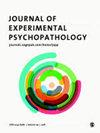在观察社交互动时,评价自己会引起对他人的评价吗?错误反馈任务后认知和情绪后果的实验研究
IF 1.9
4区 医学
Q4 PSYCHIATRY
引用次数: 0
摘要
引言尽管几十年来一直在研究社交焦虑症患者如何评价自己和他人,但目前尚不清楚消极评价自己的人是否也会消极评价他人。其他评估研究的结果模棱两可,可能是由于方法差异和操作不一致。社会认知和认知行为模型表明,负面的自我评价可能会导致参与者随后对明显焦虑的人进行负面评价。我们通过实验验证了这一假设,使用视频记录的社交互动和新颖的虚假反馈操纵。方法:169名未经选择的参与者完成了基线问卷调查和与一名同伴的10分钟即兴对话任务。我们随机分配参与者接受关于他们表现的积极、模棱两可或消极的虚假反馈。接下来,他们评估了自己的表现,并观看了一位焦虑自信的演讲者之间的对话录音。最后,他们评估了焦虑者的表现。结果:我们的手法是有效的;负反馈条件下的参与者对自己的评价更为负面。然而,在大多数认知和情绪结果上,条件之间没有差异。讨论:在未选择的样本中,对自己进行负面评价可能不会导致人们在记录的社交互动中对明显焦虑的人进行负面评价。未来的研究应该在不同的时间和背景下,通过临床样本来检验这种关系。本文章由计算机程序翻译,如有差异,请以英文原文为准。
Does evaluating oneself cause evaluations of others while observing a social interaction? An experimental investigation of the cognitive and emotional consequences following a false-feedback task
Introduction Despite decades of research on how people with social anxiety evaluate themselves and others, it remains unclear whether people who evaluate themselves negatively also evaluate others negatively. Findings from other-evaluation research are equivocal, perhaps attributable to methodology differences and inconsistent operationalization. Social-cognitive and cognitive-behavioural models suggest that negative self-evaluations may cause participants to subsequently evaluate a visibly anxious person negatively. We tested this hypothesis experimentally, using a video-recorded social interaction and novel false-feedback manipulation. Methods: 169 unselected participants completed baseline questionnaires and a 10-min impromptu conversation task with a confederate. We randomly assigned participants to receive positive, ambiguous, or negative false-feedback about their performance. Next, they evaluated their own performance and watched a recorded conversation between an anxious and confident speaker. Finally, they evaluated the anxious person’s performance. Results: Our manipulation was effective; participants in the negative-feedback condition rated themselves more negatively. However, no differences emerged between conditions on most cognitive and emotional outcomes. Discussion: Evaluating oneself negatively, on its own, may not lead people to evaluate a visibly anxious person in a recorded social interaction negatively in a single-session experiment within an unselected sample. Future studies should examine this relationship with a clinical sample across time and contexts.
求助全文
通过发布文献求助,成功后即可免费获取论文全文。
去求助
来源期刊

Journal of Experimental Psychopathology
Medicine-Psychiatry and Mental Health
CiteScore
2.00
自引率
0.00%
发文量
19
审稿时长
11 weeks
期刊介绍:
The Journal of Experimental Psychopathology (EPP) is an open access, peer reviewed, journal focused on publishing cutting-edge original contributions to scientific knowledge in the general area of psychopathology. Although there will be an emphasis on publishing research which has adopted an experimental approach to describing and understanding psychopathology, the journal will also welcome submissions that make significant contributions to knowledge using other empirical methods such as correlational designs, meta-analyses, epidemiological and prospective approaches, and single-case experiments.
 求助内容:
求助内容: 应助结果提醒方式:
应助结果提醒方式:


